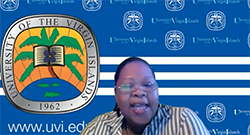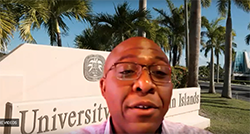Support for Frontline Government Workers At-Risk for Burnout in the U.S. Virgin Islands
The Coping With Burnout Webinar Series
Publication Date: 2023
Translating Research Into Action
The Coping With Burnout Webinar Series was developed to teach coping strategies to help frontline disaster professionals in the U.S. Virgin Islands handle the stress of cascading and compounding events. The series includes two three-hour recorded webinars. Click on the images below to watch.


Introduction
Our original Public Health Research Award study—Frontline Government Workers: Assessing Post-Disaster Burnout and Quality of Life—examined frontline workers from nine government sectors in the U.S. Virgin Islands. A frontline worker was defined as a public sector employee who has a direct role of in addressing citizen needs through the provision of public services. Frontline workers operate regardless of harsh conditions and harms caused by disasters. This research assessed the level of burnout and quality of life among a sample of USVI frontline government workers following Hurricanes Irma and Maria, as well as during COVID-19.
Our analysis uncovered a significant difference between burnout experiences during the hurricanes compared to those during the pandemic. Additionally, there were various relationships between the subscales of burnout and quality of life for frontline government workers following Hurricanes Irma and Maria, as well as during COVID-19. Specifically, emotional exhaustion and compassion fatigue were at the core of psychological challenges faced by USVI frontline government workers during disasters. Our previous findings ultimately reported that frontline government workers were experiencing burnout during Hurricanes Irma and Maria, as well as throughout the COVID-19 pandemic. The focused subscales of emotional exhaustion and secondary traumatic stress had the strongest relationship with burnout, which became the root of our public health implications.
These research findings informed the continuation project’s objectives and design. Having confirmed the existence of burnout and observing the need to create mechanisms to combat these public health challenges, the current project’s purpose and design was to offer webinars to frontline government workers and managers that will help them to develop resiliency and coping strategies, as well as improve their abilities to self-manage mental health. This project also focused on maintaining the noted levels of personal accomplishments that were present during the initial study.
Community Partners
The National Social Work Association, Virgin Islands Chapter, supported our work by guiding us to the best facilitators for our webinars. They recommended and endorsed presenters who were capable of offering the best training for frontline government workers and their managers. In our original study, nine agencies and departments in the U.S. Virgin Islands, which employs large numbers of frontline government workers, served as study participants. These participants also served as our key stakeholders for the webinar series and its specially crafted sessions and panels. The nine agencies included were:
- Virgin Islands Police Department
- Virgin Islands Fire Service
- Virgin Islands Department of Human Services
- Virgin Islands Territorial Emergency Management Agency
- Department of Licensing and Consumer Affairs
- Virgin Islands Bureau of Motor Vehicles
- Department of Planning and Natural Resources
- Roy Schneider Regional Hospital
- Juan F. Luis Hospital
To recruit webinar participants, we sent letters were sent to agency heads requesting their participation in the webinar series. From there, invitation letters were sent to frontline employees in these agencies. Employees then registered for the webinars to receive additional webinar information including the link. Reminder emails were sent one day before the webinars.
Project Activities and Results
Our team’s main goal was to create a platform that could enable frontline government workers to manage their stress. Since we know that improvement of overall outlook and quality of life of frontline government workers can improve public health, we felt it most important that employees have access to a means to better manage stress.
To accomplish this goal, we created the Coping with Burnout Webinar Series. To successfully carry out this webinar series, we recruited professionals in the fields of social work, mental health, and counseling. These experts offered support and evidence-based techniques that can improve quality of life for frontline government workers and managers in the U.S. Virgin Islands.
The webinar series was held on March 7 and 8, 2023. The first day of the webinar series was dedicated to managers and department heads of frontline government agencies. This webinar focused on providing managers with methods for protecting their own emotional health as well as techniques for how to ensure that their employees are able to cope. The second day of the webinar specifically targeted frontline employees. Frontline workers were able to engage, ask questions, and discover valuable techniques for their mental wellbeing.
The experts organized the webinars into several highly informative and interactive sessions that addressed the themes that our research had noted as important in combating burnout and related factors. These sessions included:
- Healthy Work-Life Balance
- Burnout Prevention and Recovery Strategies: Understanding the Importance of Self-Care and Management Skills
- Recognizing Signs and Symptoms of Burnout
- Supporting Frontline Government Workers
- When Employees Hurt: Interventions from the Workplace
- Creating a More Resilient You
- Coping Practices: Mental and Emotional Health
In total, about 600 frontline government workers and managers participated in the Coping with Burnout Webinar Series. At the conclusion of the sessions, our team encouraged participants to complete a satisfaction survey. In total, 157 participants completed the online survey. Nearly all participants who completed the survey (97%) agreed they had a positive experience attending the webinar event. A whopping 99% felt the presenters were knowledgeable, and 98% believed that the subject matter presented was effective. Also, about 96% of participants completing the survey felt that they would apply what they learned from the sessions. And 96% of survey participants felt that the sessions delivered the information that they expected to receive.
There was also an open-ended written component to the survey. Some participant comments included:
- “This presentation was timely, informative, and shared invaluable techniques that I will intentionally adapt in improving my self-care habits.”
- “On a journey to a better ME! Thank you!!”
- “I feel renewed already.”
- “Awesome sessions. I knew I was burned out, but I didn’t realize how much. Thank you for sharing with us.”
- “It was very informative and engaging.”
- “I love that self-care is not selfish. Learning how to focus on self-care was something I needed to hear.”
- “There needs to be more of this training available for government agencies. The stress levels are way too high.”
In addition to the positive responses we yielded from our satisfaction survey, we received a number of emails and calls about access to the recordings of the webinars. We have since published the webinars on a YouTube channel, so that employees can have access whenever they like. We are also working with two agencies, who will now offer burnout training for their employees on an annual basis. We took note of the positive response and benefit this continuation project has had on the frontline government workers in the U.S. Virgin Islands. We are also happy that all of our outcomes were achieved. Participants were able to learn new techniques for coping with burnout. They also have access to this material whenever they need it.
Reflections and Lessons Learned
The Coping with Burnout Webinar Series was of great benefit to frontline managers and staff. They were able to gain advanced knowledge from experts on how to cope with the issues of stress and improve self-care. The improved sense of mental health among these employees will ultimately have an impact on the greater community of the USVI. With the region’s susceptibility to a variety of natural hazards, it is imperative that frontline employees continue to be supported to enhance their overall wellbeing. Remembering that they are responsible for taking care of the entire community during times of peril and hazardous events will ensure that they are capable of doing their jobs. If the USVI community is to expect that employees are available to serve them, then they must ensure that employees are mentally ready.
While this project included nine agencies and organizations who deal firsthand with many segments of the population, our team believed that there were additional agencies, such as Department of Health, Department of Labor, and Bureau of Corrections, that could have benefited from this webinar series. We know that participation in this project would have been beneficial for many other frontline workers. In essence, we would have welcomed a wider span of participants. Nevertheless, we are excited that the webinar series recordings are accessible to other agencies that did not participate. Our hope is that employees in other agencies will also gain from it.
Having the opportunity to translate our research into practice was worthwhile beyond our expectations. Our initial research on burnout underscored the mental health challenges of many employees in the U.S. Virgin Islands. Because of our continuation project, we saw the data translated into real life outcomes. As participants commented in the chat feature of the Zoom webinars, we understood their hardships, appreciated their candor, and respected their efforts in an elevated manner. Although we found significance through our original research, there was a stronger sense of consciousness felt by our research team during the process of translating our research into practice.
Coping With Burnout Webinar Series
We recorded both webinars so that they could be used by other frontline workers and managers in the U.S. Virgin Islands and beyond.
Coping With Burnout Day 1: For Managers
This webinar engaged commissioners, directors, and supervisors of frontline government workers in the U.S. Virgin Islands.
Date: March 7, 2023
Coping With Burnout Day 2: For Frontline Government Workers
This webinar presented expert advice, recommendations, and support to frontline government employees who struggle with issues of burnout in the U.S. Virgin Islands.
Date: March 8, 2023
Acknowledgments. The Coping with Burnout Team would like to express our gratitude to the National Social Work Association, Virgin Islands Chapter, and President, Arlene Garcia; our expert panel and presenters, Latashia Joseph Edwards, Sharon Ross-Donaldson, Katrina Boone, and the commissioners, directors, and managers of Virgin Islands Police Department, Virgin Islands Fire Service, Virgin Islands Department of Human Services, Virgin Islands Territorial Emergency Management Agency, Department of Licensing and Consumer Affairs, Virgin Islands Bureau of Motor Vehicles, Department of Planning and Natural Resources, Roy Schneider Regional Hospital, and Juan F. Luis Hospital. We especially would like to thank the hard working frontline government workers of the U.S. Virgin Islands. Your hard work does not go unnoticed.
Francis, K. A., Hendrickson, K. A, & Clarke, A. M. (2023). Support for Frontline Government Workers At-Risk for Burnout in the U.S. Virgin Islands: The Coping With Burnout Webinar Series. Natural Hazards Center Public Health Disaster Research Community Engagement Brief Series, 1. University of Colorado Boulder. https://hazards.colorado.edu/public-health-disaster-research/support-for-frontline-government-workers-at-risk-for-burnout-in-the-u-s-virgin-islands